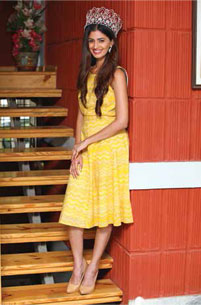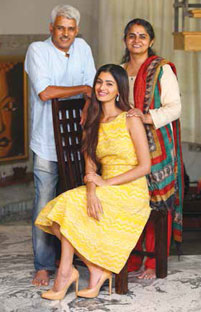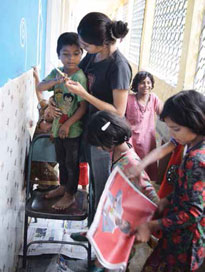
The rigours behind arc lights, beauty pageants and modelling assignments are enough to throw away any Sushruthi Krishna, co-founder of Anatta, an NGO that supports and offers expertise for creating suitable infrastructure across target schools in Bangalore for raising awareness and improving sanitation and hygiene. Sushruthi, the 1st runner up at the FBB Femina, Miss India 2016 contest, wears many hats. For her, social work is something which has been culturally in-built within her home sphere with both her mother and brother being involved in social sectors even before she nurtured her plans with co-founder, Aditya Venkataraman to set up Anatta. In a chat with Corporate Citizen, Sushruthi expresses her quest to bring back these children to schools through good sanitation and infrastructure management in government-run and aided schools
Initially, we started off with Anatta as two students of architecture. I had previously visited a school in Varthur, Bangalore, and was generally studying on the prospects of redeveloping government schools. What are the kinds of possible designs you would work on etc.? That is when we first came across the issue of lack of infrastructure in schools. ...When we saw the bathrooms, we were literally taken aback because they did not have ventilators or doors. They did not even have something as simple as an Indian pan and even if they did, then they did not have flush! So, we thought that health is something that is definitely of importance and if we were to get school children back into schools, health is the first place we need to start with for a good and healthy learning environment and that is why we started Anatta,” said Sushruthi.
“Anatta is actually a word that is derived from Pali and it means “no-self ”. So, whenever we work, we don’t really see who you are or how much the person (as team member) has been working or will be working. We look at the intention. Do you want to work? How do you feel you can contribute to what we are doing?”
“Anatta is more than non-profit and I would say it is literally something we are doing out of goodwill”, which started when both Sushruthi and Aditya were researching about toilets and schools. “But, we were having so many road blocks because the government would get involved sometimes especially in rural set-ups. Also, how to work with these schools and how comfortable these schools would be in having you over and working with them was a challenge. Besides, where do you get the budgets from? So, with all of that, we faced a lot of roadblocks but then we read an article on Let’s Do Some Good Foundation (LDSG), a social responsibility platform and it’s founder Shoma Bakre and thought, “There is a lady out there doing that so, why don’t we collaborate. If you have seen how we work, we are open to collaboration with all kinds of NGOs...”
For Mysore born Sushruthi, despite her privileged upbringing and educational graphs spread across DPS South Bangalore, R.V.College of Architecture, Bangalore and the critical three years spent at South Windsor, Connecticut, US, her visits to government schools as an architect nurtured her to do something towards lack of basic toilet facilities and other infrastructure discrepancies in these schools. Her calling was, “...In good schools, we all know infrastructure has never been the problem, so when you see one single classroom serving a mix of 1st, , 2nd and 3rd graders; simply because they don’t have independent classrooms, you then understand that while it is so simple it is also so difficult for them to get something as simple as infrastructure...”
For her, striking the right pose as a beauty queen has now taken on a new meaning in her innate passion to bring about social change. Her understanding of construction jargons and rigmaroles in her role as an architect just seems to tie-in with her choice to service infrastructure bottlenecks in these aided schools.
“The challenging task is to convince parents of these kids who lead a hand to mouth existence. Most of the kids we worked with had parents who were into petty crimes, or balloon selling etc.... For them, it is just about survival....They don’t think about the larger possibility if their child is educated. One of the biggest challenges that we have faced along with the school is to retain students and bring them back in school. Their thinking was if we send our child out to work we might earn Rs. 50 extra per day but they don’t understand that if they send them to school, 10 years later you are going to earn say, Rs. 5000 per day. ... This section of society needs a lot more focus...”
"...My passion has always been for design. So, in terms of your intelligence, understand what you are passionate about, and in what you believe in. Be beautiful from the inside and if you can get a good balance of the two, being pretty on the outside is something that will eventually come..."
"She is a great young role model who has taken “beauty with a purpose” very seriously and is committed to put in her efforts to bring about positive social change - Shoma"

Co-founder Aditya and Sushruthi realised soon enough that there is no mandate on motivating students to continue education in government or rural schools and that infrastructure is the last thing they would worry about. There is very low ownership of physical assets in these schools which is deemed as public property for public use; albeit without any responsibility to maintain the meager facilities provided. They learnt that most of these schools do not have the vision or the mind-set and are ill-equipped to bring about changes to the ecosystem. It then translates to low parental expectations of their wards in these schools.
“So, the objective with which we set out was really to just provide a good and healthy learning environment and to help children understand the importance and to value the things which come free to us. While we are providing the infrastructure, we also want them to understand and know that with everything you get, there is a certain responsibility. Teaching them on how to take care of your environment is what we also do.... How to keep it clean? How not to vandalise it? How do you ensure that you have had this privilege; so the next who is coming into school also has the privilege of using the facility; that is something that is very important which we try to encourage in each of our sessions.”
“When I spoke to Shoma, she did not believe that I would do any work. Because, I don’t know, I think, people don’t really believe that beauty queens actually end up doing any real work! We do work. Shoma called on Sushruthi and said that they have this upcoming one project and if they were willing to do it. “Definitely we were. Aditya was not available on that day so, I ended up going to this school all by myself in Vijayanagar, Bangalore which is the first project that we did. By the time I came back, I had fallen ill and the reason being was that the toilet was in such a terrible condition there”.
She reminisced that, “The piping of the toilets was completely broken and the sewage was all outside; so I could see it and there were flies everywhere. The soak pits and the chambers were not working and the entire space behind the toilet was like a field of bacteria. So, by the time I came back, I fell ill for the next four days. That made me wonder - the kids are living there so, how much worse could it be for them.”
In her case, being an architect helped in her chosen social goals. “If it is your field, you are anyways going to work to make money but it is also important that you can bring that knowledge and if you can give it back to somebody; that makes a lot of difference.”
As Shoma said, “She is a great young role model who has taken "beauty with a purpose" very seriously and is committed to put in her efforts to bring about positive social change.”

Aditya and Sushruthi then met up with their contractor and explained the situation which thus kick-started their very first project. “Shoma actually completely believed in us only once we had completed the project and handed it to her saying that this is the kind of work we are hoping to keep doing. Shoma then assessed the quality of work on its craftsmanship and good detailing in construction work which was verified by LDSG’s own contractor and finally she was convinced,” said Sushruthi.
“Shoma helps us find schools as well as helps with the funding. We have signed a very basic contract with LDSG. Since, we are not a registered NGO, funding is a problem as we need to route the money through somebody else. However, since we have a high degree of transparency with Shoma’s LDSG organisation; and the way we work, we have a very good relationship with them. ... So, every single bill that comes in goes to Shoma and there have been no real problems that we have faced so far.”
“We work with our own team. The entire execution happens with us while as of now, the entire funding happens through LDSG. The contractors are with us, the people who prepare the bills and the vendors are ours. So, we take care of the entire execution of these toilet projects.”
“Initially, it was just the two of us and it was quite taxing as both of us were working in our core professions as architects. After we finished our day’s job, we used to go to the site (for school projects) and figure out what was happening. ...But, then we were fortunate to have a lot of people approach us and offer help especially our colleagues and friends. They would ask us if they could contribute and this is how the team built itself. We sat with each person that came into the team and spoke to them in terms of what we were trying to achieve and by associating with us, we also tried to understand on what they hoped to achieve from working on our projects.”
Anatta is seeking to go beyond these individual contributors and add on other stakeholders for wider coverage of their future goals.
The primary step of Anatta’s program module is to build toilets. “The basic module is just building the infrastructure part of it and something called “the wall talk”. For residential school, the problems are as simple as the kids do not brush their teeth as they don’t have their parents around. They don’t take a bath, do not wash their hands, eat whenever they feel like and those are the kind of problems that we also address.”
The idea of ‘Wall Talks’ is literally that the wall in front of you talks to you daily .We paint all of these things that we teach them, on the wall. It could be brush your teeth daily or clean your hands, or brush your teeth twice a day or take a bath daily and make sure toilets are clean....They read it every day when they go to the toilet. When we do ‘Wall Talks’, we see what is the problem in that particular school. We have a general module that we have written out internally and we adapt it to that particular situation. We talk to the children about it. We believe that visual reinforcement is something that really helps in getting it into your system...
“The third thing in the course is about hygiene and menstrual cycle. It is something we are still working on and trying to collaborate with another NGO because they specialise more in that. Here we talk about the different aspect of health and about how your body changes at different points of time. How it is important to respect women and men. In a lot of schools what happens is when they do not have a lot of rooms in toilets, you have the boys peeking into the girls’ toilet and so it is about teaching children about respecting each other’s boundaries too...”
“...A lot f times when girls come to school they wear a sanitary pad in the morning and don’t change till they go back home or they don’t come to school on those days. So, how do you deal with that kind of a situation because a lot of this is not taught at home as their parents are very uncomfortable about speaking about it? We teach them in terms of how you deal with these as part of a module which is different for each age group -Grade 1 to Grade 4, Grade 5 to Grade 8, and so on.”
Initially, it was just the two of us and it was quite taxing as both of us were working in our core professions as architects. After we finished our day’s job, we used to go to the site and figure out what was happening- Sushruthi

“We really just aim to be able to provide good infrastructure for as many schools as possible. We want to build at least 50 toilets in 12 months starting June 2016. More than just providing infrastructure, it is equipping children with knowledge that they need to be responsible towards what they have.”
Although current funding is routed through LDSG, Anatta is trying to start off the process of brainstorming on how to also garner funds independently. “We are trying to approach companies like Intel, HP, Himalaya, Manipal and Future group and are quite new in terms of understanding the realms. I think corporate funding is a different game by itself. So, alongside Shoma, who has a deeper understanding into that, we are trying to figure out how to get ourselves to connect with corporate and are on a learning process on this at the moment.”
The most important thing for me is firstly to be beautiful from the inside, even if you look like a wreck and go like a college student, but, be beautiful from inside. To be positive in your thoughts, and to believe and dream big, because that is something that starts within you and when you are able to communicate that to other people then I think, they see beauty more in that.
Then again, there is the grooming part of it that comes eventually as and when you learn about your different fields because grooming is very different for each field... Outer beauty is more adaptive to what you are doing at that point in time, and brains are something I belief that every person has the potential to be doing something big. It is important that you identify and work with something that you love doing because if you had probably convinced me to be a doctor I would be the most terrible doctor there is!”
By Sangeeta Ghosh Dastidar